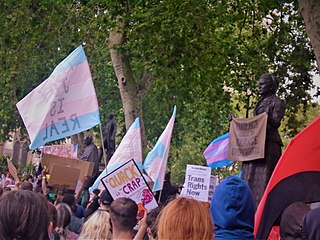
The rights of lesbian, gay, bisexual, transgender, and queer (LGBTQ) people in the United Kingdom have developed significantly over time. Today, lesbian, gay and bisexual rights are considered to be advanced by international standards, while transgender, gender-nonconforming and non-binary people face some of the highest levels of discrimination of any modernised country.
Gender dysphoria in children (GD), also known as gender incongruence of childhood, is a formal diagnosis for distress caused by incongruence between assigned sex and gender identity in some pre-pubescent transgender and gender diverse children.

Transgender youth are children or adolescents who do not identify with the sex they were assigned at birth. Because transgender youth are usually dependent on their parents for care, shelter, financial support, and other needs, they face different challenges compared to adults. According to the World Professional Association for Transgender Health, the American Psychological Association, and the American Academy of Pediatrics, appropriate care for transgender youth may include supportive mental health care, social transition, and/or puberty blockers, which delay puberty and the development of secondary sex characteristics to allow children more time to explore their gender identity.
Puberty blockers are medicines used to postpone puberty in children. The most commonly used puberty blockers are gonadotropin-releasing hormone (GnRH) agonists, which suppress the natural production of sex hormones, such as androgens and estrogens. Puberty blockers are used to delay puberty in children with precocious puberty. Since the 1990s, they are also used to delay the development of unwanted secondary sex characteristics in transgender children, so as to allow transgender youth more time to explore their gender identity under what became known as the "Dutch Protocol". They have been shown to reduce depression and suicidality in transgender and nonbinary youth. The same drugs are also used in fertility medicine and to treat some hormone-sensitive cancers in adults.
Feminist views on transgender topics vary widely.
The Swedish Women's Lobby is a Swedish feminist organization that strives to achieve and improve women’s rights and freedoms.

TERF is an acronym for trans-exclusionary radical feminist. First recorded in 2008, the term TERF was originally used to distinguish transgender-inclusive feminists from a group of radical feminists who reject the position that trans women are women, reject the inclusion of trans women in women's spaces, and oppose transgender rights legislation. Trans-inclusive feminists assert that these ideas and positions are transphobic and discriminatory towards transgender people. The use of the term TERF has since broadened to include reference to people with trans-exclusionary views who are not necessarily involved with radical feminism. In the 2020s, the term "trans-exclusionary radical feminism" is used synonymously with or overlaps with "gender-critical feminism".
Transgender health care includes the prevention, diagnosis and treatment of physical and mental health conditions which affect transgender individuals. A major component of transgender health care is gender-affirming care, the medical aspect of gender transition. Questions implicated in transgender health care include gender variance, sex reassignment therapy, health risks, and access to healthcare for trans people in different countries around the world. Gender affirming health care can include psychological, medical, physical, and social behavioral care. The purpose of gender affirming care is to help a transgender individual conform to their desired gender identity.

Transgender rights in the United Kingdom have varied significantly over time.
Detransition is the cessation or reversal of a transgender identification or of gender transition, temporarily or permanently, through social, legal, and/or medical means. The term is distinct from the concept of 'regret', and the decision may be based on a number of reasons, including a shift in gender identity, health concerns, social or economic pressure, discrimination, stigma, political beliefs, or religious beliefs.
The Gender Identity Development Service (GIDS) was a nationally operated health clinic in the United Kingdom that specialised in working with transgender and gender diverse youth, including those with gender dysphoria. Launched in 1989, GIDS was commissioned by NHS England and took referrals from across the UK, although it was operated at a Tavistock and Portman NHS Foundation Trust site. GIDS was the only gender identity clinic for people under 18 in England and Wales and was the subject of much controversy.
The LGB Alliance is a British advocacy group and registered charity founded in 2019 in opposition to the policies of LGBT rights charity Stonewall on transgender issues. Its founders are Bev Jackson, Kate Harris, Allison Bailey, Malcolm Clark and Ann Sinnott. The LGB Alliance describes its objective as "asserting the right of lesbians, bisexuals and gay men to define themselves as same-sex attracted", and states that such a right is threatened by "attempts to introduce confusion between biological sex and the notion of gender". The group has opposed a ban on conversion therapy that includes trans people in the UK, opposed the use of puberty blockers for children, and opposed gender recognition reform.

Transgender Trend is an anti-trans British pressure group, which describes itself as a group of parents, professionals and academics who are concerned about the number of children diagnosed with gender dysphoria. It was founded in 2015 by Stephanie Davies-Arai.

Stella O'Malley is an Irish psychotherapist and author, with three books on parenting and mental health. She is a regular contributor to Irish national newspapers, podcasts, and TV. She made a documentary about gender dysphoria in children for Channel 4, and is the founder of Genspect, a self-described gender critical organisation opposed to gender affirming care.
The Women's Declaration International (WDI), formerly the Women's Human Rights Campaign (WHRC), is an international advocacy organisation founded in the United Kingdom. WDI has published a Declaration on Women's Sex-Based Rights, and has developed model legislation to restrict transgender rights that has been used in state legislatures in the United States.
Gender-critical feminism, also known as trans-exclusionary radical feminism or TERFism, is an ideology or movement that opposes what it refers to as "gender ideology". Gender-critical feminists reject transgender identities and consider the concepts of gender identity and gender self-identification to be inherently oppressive constructs tied to gender roles. They believe that sex is biological, immutable, and binary, and that people should only be identified based on their biological sex rather than their gender identity.

Genspect is an international group founded in June 2021 by psychotherapist Stella O'Malley that has been described as gender-critical. Genspect opposes gender-affirming care, as well as social and medical transition for transgender people. Genspect opposes allowing transgender people under 25 years old to transition, and opposes laws that would ban conversion therapy on the basis of gender identity. Genspect also endorses the unproven concept of rapid-onset gender dysphoria (ROGD), which proposes a subclass of gender dysphoria caused by peer influence and social contagion. ROGD has been rejected by major medical organisations due to its lack of evidence and likelihood to cause harm by stigmatizing gender-affirming care.

The Independent Review of Gender Identity Services for Children and Young People was commissioned in 2020 by NHS England and NHS Improvement and led by Hilary Cass, a retired consultant paediatrician and the former president of the Royal College of Paediatrics and Child Health. It dealt with gender services for children and young people, including those with gender dysphoria and those identifying as transgender in England.
Therapy First, originally named the Gender Exploratory Therapy Association (GETA), is a group created in 2021 by members of the Society for Evidence-Based Gender Medicine (SEGM) and Genspect to advocate gender exploratory therapy, which experts consider to be a form of conversion therapy.
False and misleading claims about gender diversity, gender dysphoria, and gender-affirming healthcare have been used to legislatively restrict transgender people's healthcare. The claims have primarily relied on manufactured uncertainty generated by various conservative religious organizations, pseudoscientific or discredited researchers, and anti-trans activists.








